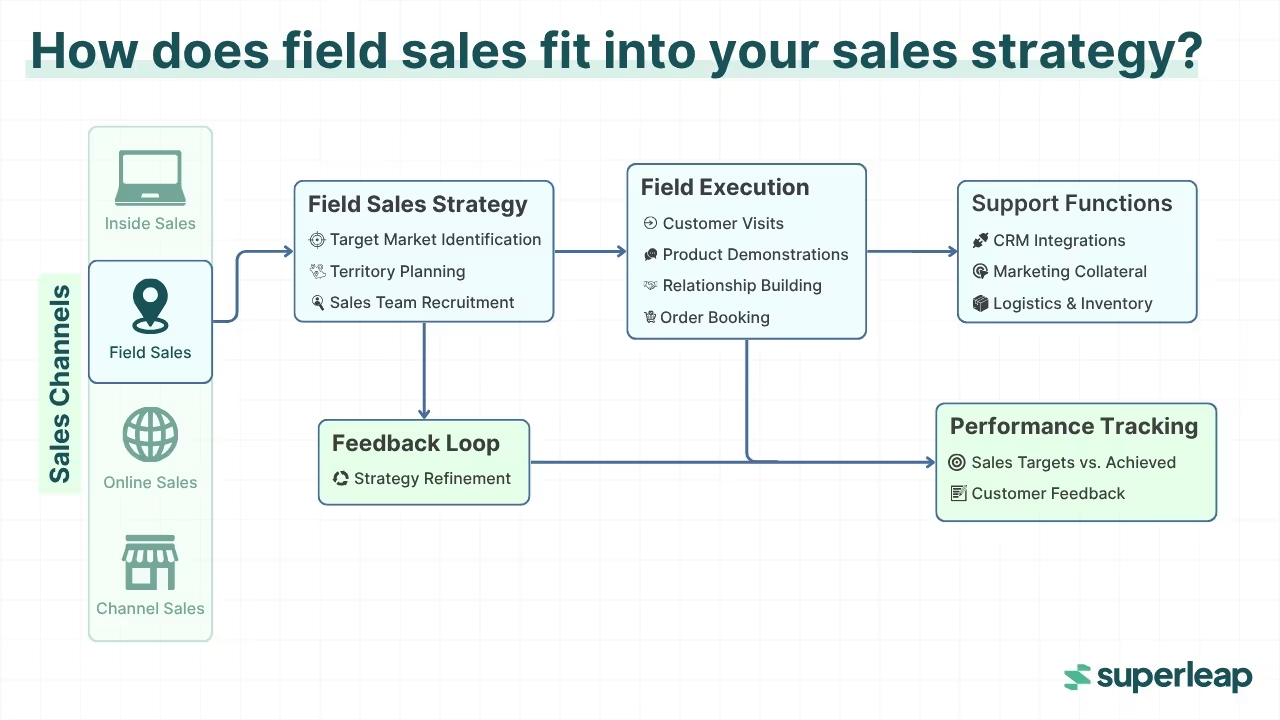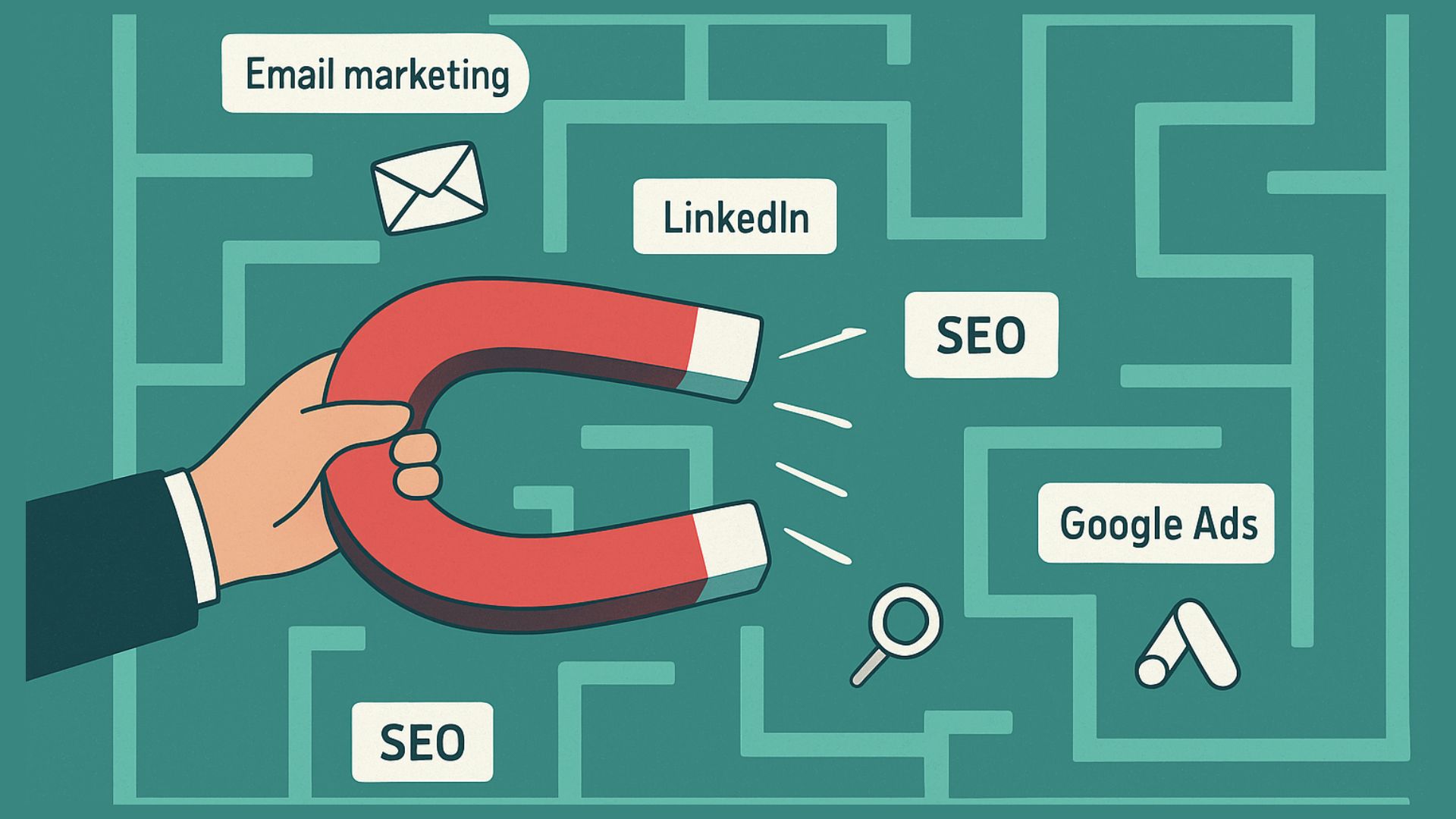

Field sales involves salespeople meeting potential customers in person, rather than relying upon online interactions. It focuses on building relationships, offering personalized solutions, and closing deals through face-to-face meetings. In simple terms, field sales means selling by meeting customers in person instead of selling remotely.
Let’s understand field sales through the example of Allie, a seasoned sales representative.
It was 8 am when Megha got into her car with her coffee cup nestled in the cupholder beside her. She was on her way to her first meeting of the day with a small business owner just down the road who needed help navigating a complex product. She had spent hours preparing for this meeting, researching the company’s pain points. As a field sales representative, this was the core of her work: hitting the road, meeting customers in person, and understanding their pain points in real-time.
While emails and calls can help build rapport, nothing compares to the impact of sitting across from a customer, hearing their concerns, and offering solutions face-to-face.
While many businesses are shifting to digital strategies, Megha’s story highlights the importance of field sales and how it continues to be one of the most effective ways to cultivate meaningful customer relationships and drive long-term success. Unlike digital communications that can sometimes feel impersonal, face-to-face interactions allow sales reps to read the customer’s body language, ask the right questions, and offer tailored solutions.
Let’s explore field sales in detail, shall we?
What is field sales?
Field sales examples
Pharmaceutical sales
Sales reps from pharmaceutical companies like Pfizer or Johnson & Johnson frequently visit doctors, hospitals, and clinics to promote and explain the benefits of their drugs or medical devices. They often provide educational materials, samples, and conduct product demos to encourage health care professionals to prescribe their products.
Automobile sales
In car dealerships like Toyota and Ford, field sales reps visit businesses or attend trade shows to pitch fleet vehicles to companies that need cars or trucks for their employees. Salespeople may also visit individual customers to give test drives, answer questions, and offer financing options.
Cosmetic direct sales
Companies like Oriflame and Amway rely heavily on field sales reps who visit potential customers' homes or host small gatherings to demonstrate and sell beauty and wellness products directly. These sales reps build personal relationships with customers and often work on commissions.
Technology sales
Cisco field sales reps often travel to meet with large businesses to discuss and demonstrate networking solutions like routers, switches, and security systems. These salespeople work closely with IT teams to customize solutions based on the needs of a company’s infrastructure.
Energy sales
Companies like Sunrun or Vivint Solar send field sales reps to homeowners to make them consider installing solar panel systems. They also provide consultations, evaluate the property, and offer personalized proposals for energy-saving solutions, often handling the entire sales process on-site.
Field sales vs Inside sales
What are the main roles and responsibilities involved in field sales?
- Prospecting
- Qualifying leads
- Setting appointments
- Conducting follow-ups
- Delivering sales presentations
- Planning routes
- Customer engagement
- Updating the CRM
When to choose field sales over inside sales?
Field sales works best in situations where personal interactions, relationship building or complex selling is essential for closing a deal. Here are the instances when field sales outperforms inside sales:
Complex or high value products
Technically complex products often require in depth demos, on site visits and longer conversations which are more effective in person,
Example: Enterprise software. Industrial machinery
Longer sales cycles
Deals which involve multiple decision makers or extensive negotiations, in person interactions can help build more trust.
Example: Infrastructure deals, corporate partnerships
Relationship driven markets
Some industries rely heavily on trust and personal rapport which are easier to develop through in-person interactions.
Example: Selling to hospitals, retail chains
Large accounts
High potential customers often expect personalised attention and perks. A field sales rep can act as consultant and relationship builder by helping customise solutions.
Example: Key account management for Fortune 500 companies
Highly regulated or sensitive sales environments
Some products require in depth explanation of legal, technical or ethical aspects which are best done in person.
Example: Financial services, defense equipment
What key skills are necessary for field sales?
- Adaptability
- Interpersonal skills
- Presentation skills
- Negotiation skills
- Time management
- Problem solving
- Organisation
- Resilience
- Empathy
What KPIs help measure field sales success?
Sales volume
This refers to the total revenue generated from closed deals. This directly reflects how well the field sales is performing.
Number of customer visits
This measures the total number of visits made to prospects or customers. A higher number indicates better customer engagement and wider territory coverage.
Lead conversion rate
This refers to the percentage of leads who converted into buying customers. This shows how effectively field reps are able to move the prospect across the pipeline and close sales. A low conversion rate indicates that there may be issues with pitch quality.
Average deal size
This refers to the total revenue divided by the number of deals closed. Larger deal sizes indicate higher efficiency as fewer deals are needed to meet targets.
Sales cycle length
This refers to the average time it takes for deal closure. Shorter sales cycles indicate that reps are closing well while longer cycles indicate inefficiencies.
What are the advantages of field sales?
- Higher scope for personalised interactions
- Helps form better customer relationships
- Access to immediate customer feedback
- Leads to higher conversion rates
- Better product demonstrations
- Reliable source for customer insights
What are the disadvantages of field sales?
- Time-consuming
- High expenditure
- Increased dependence on human factors
- Scalability issues
- Limited reach
- Challenges in terms of weather and location
What are the challenges involved in field sales and how to tackle them?
Time management
Sales reps often have to juggle between multiple meetings, travel, and paperwork which can make time management difficult.
Solution: Learn to prioritize meetings and territories, use scheduling tools or apps to stay organized, and batch appointments in specific areas to minimize travel time. Consider adopting a CRM software like Superleap to track appointments and follow-ups.
Travel fatigue and costs
Extensive travel can lead to burnout and also incurs high expenses for transportation, lodging, and meals.
Solution: Plan routes efficiently, limit travel to high value prospects and customers, and conduct virtual meetings for initial conversations or follow-up discussions when in-person meetings aren’t essential.
Limited reach
Sales reps can only meet a limited number of customers each day which can restrict overall outreach.
Solution: Use digital tools and inside sales teams to support outreach between face-to-face meetings. A hybrid approach where both field and inside sales work together can help maximize reach.
Unpredictable weather and traffic
External factors like weather, traffic, or other unforeseen events can disrupt schedules.
Solution: Build flexibility into daily schedules, leaving extra time between meetings to accommodate delays. Stay in close contact with customers in case of last-minute changes or rescheduling.
Managing customer appointments
Customers may cancel meetings or may not be available when the sales rep arrives, which can lead to a waste of time and resources.
Solution: Confirm appointments ahead of time and maintain proactive communication with customers. Consider setting up alternative modes of communication, such as phone calls, in case customers are unavailable for in-person meetings.
Heavy competition
Sales reps face harsh competition, especially in crowded or saturated markets.
Solution: Stand out by focusing on building strong relationships, offering personalized solutions, and demonstrating value that aligns with the customer's needs.
Customer resistance to in-person meetings
With the rise of digital communication, some customers may prefer not to meet in person.
Solution: Be respectful of the customer’s preferences and offer virtual meetings or webinars as alternatives but emphasize the benefits of face-to-face interaction when necessary.
Gathering real-time data
Field sales reps may struggle to capture and share important sales data on the go which can delay reporting and decision-making.
Solution: Superleap CRM offers mobile access which can be used to capture notes, update information, and log interactions in real-time.
What are some best practices for effective field sales?
Gain in-depth knowledge about your product and market
- Be thoroughly familiar with the features, benefits, and value of your product.
- Understand your target market's needs and challenges to tailor your approach accordingly.
Prepare well before each visit
- Research your prospects beforehand to understand their business needs and requirements.
- Set clear goals for each meeting to make the most out of it.
Create personalised sales pitches
- Listen actively to understand your customer’s needs.
- Personalize your pitch based on what you learn during the conversation.
Handle objections with grace
- Be prepared for common objections and respond calmly and thoughtfully.
- Use objections as an opportunity to further highlight your product's benefits.
Leverage technology wherever possible
- Use a CRM software like Superleap to stay organized, track leads, and manage follow-ups.
- Use mobile apps to access customer information and stay on top of your schedule.
Time management
- Prioritize high-value prospects.
- Use the time available between meetings to review notes, make calls, or plan ahead.
Focus on your presentation skills
- Be professional, well-prepared, and confident in every interaction.
- Use product demos or visuals to illustrate your offer’s value and create excitement among the customers.
Take feedback seriously
- Regularly assess your performance and seek feedback to refine your approach.

Heading text
Nunc sed faucibus bibendum feugiat sed interdum. Ipsum egestas condimentum mi massa. In tincidunt pharetra consectetur sed duis facilisis metus. Etiam egestas in nec sed et. Quis lobortis at sit dictum eget nibh tortor commodo cursus.
Odio felis sagittis, morbi feugiat tortor vitae feugiat fusce aliquet. Nam elementum urna nisi aliquet erat dolor enim. Ornare id morbi eget ipsum. Aliquam senectus neque ut id eget consectetur dictum. Donec posuere pharetra odio consequat scelerisque et, nunc tortor.
Nulla adipiscing erat a erat. Condimentum lorem posuere gravida enim posuere cursus diam.
.svg)






